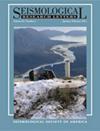地震噪声相关性排序改进表面波检索和噪声源表征
IF 3.2
3区 地球科学
Q2 GEOCHEMISTRY & GEOPHYSICS
引用次数: 0
摘要
交叉相关连续地震资料是一种常用的提取相干信号进行地下成像和监测的技术。然而,由于海洋环境中的场地效应和特征不佳的噪声源,它在海底地震仪记录中的应用往往需要额外的处理。在这篇论文中,我们提出了一种方法来提高从OBS数据中检索到的表面波的质量并表征噪声源。我们首先基于排序算法对叠前噪声互相关函数(nfc)进行聚类,然后选择性地叠加那些由与预测的表面波到达时间一致的相干和稳定信号组成的信号。综合实验表明,序列nfc可用于恢复噪声源的时空分布。将该方法应用于加利福尼亚近海的OBS阵列,可以提高所获得的瑞利波的信噪比。此外,我们发现在记录期间,频率在0.04 ~ 0.1 Hz范围内的nfc的年时间分布几乎是均匀的。相反,许多被排除在叠加之外的nfc是暂时聚类的。该方法有可能应用于其他海底地震仪记录或可能的陆上部署,从而有助于获得高质量的表面波并分析时间噪声源特性。本文章由计算机程序翻译,如有差异,请以英文原文为准。
Sequencing Seismic Noise Correlations for Improving Surface Wave Retrieval and Characterizing Noise Sources
Abstract Cross-correlating continuous seismic data is a commonly employed technique to extract coherent signals to image and monitor the subsurface. However, due largely to site effects and poorly characterized noise sources in oceanic environments, its application to ocean-bottom seismometer (OBS) recordings often requires additional processing. In this contribution, we propose a method to improve the quality of the retrieved surface waves from OBS data and characterize the noise sources. We first cluster the pre-stack noise cross-correlation functions (NCFs) based on a sequencing algorithm, followed by selectively stacking those consisting of coherent and stable signals that are consistent with predicted surface-wave arrival times. Synthetic tests show that the sequenced NCFs can be used to recover the spatial and temporal distribution of noise sources. Applying the method to an OBS array offshore California increases the signal-to-noise ratios of the obtained Rayleigh waves. In addition, we find that the annual temporal distribution of selected NCFs with frequencies ranging from 0.04 to 0.1 Hz is nearly homogeneous during the recording period. In contrast, many NCFs excluded for stacking are temporally clustered. This method has the potential to be applied to other OBS recordings or possibly onland deployments, thus helping to obtain high-quality surface waves and to analyze temporal noise source characteristics.
求助全文
通过发布文献求助,成功后即可免费获取论文全文。
去求助
来源期刊

Seismological Research Letters
地学-地球化学与地球物理
CiteScore
6.60
自引率
12.10%
发文量
239
审稿时长
3 months
期刊介绍:
Information not localized
 求助内容:
求助内容: 应助结果提醒方式:
应助结果提醒方式:


